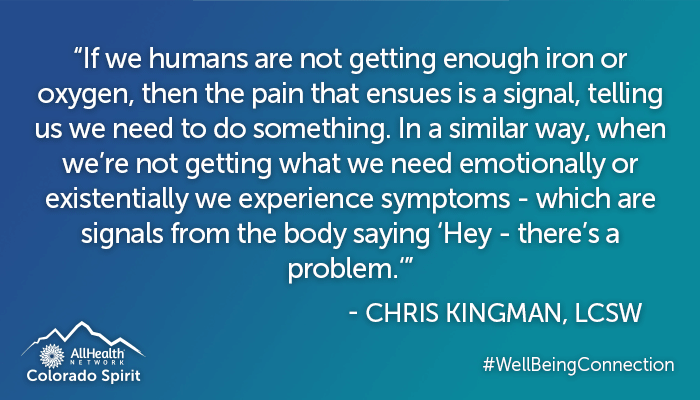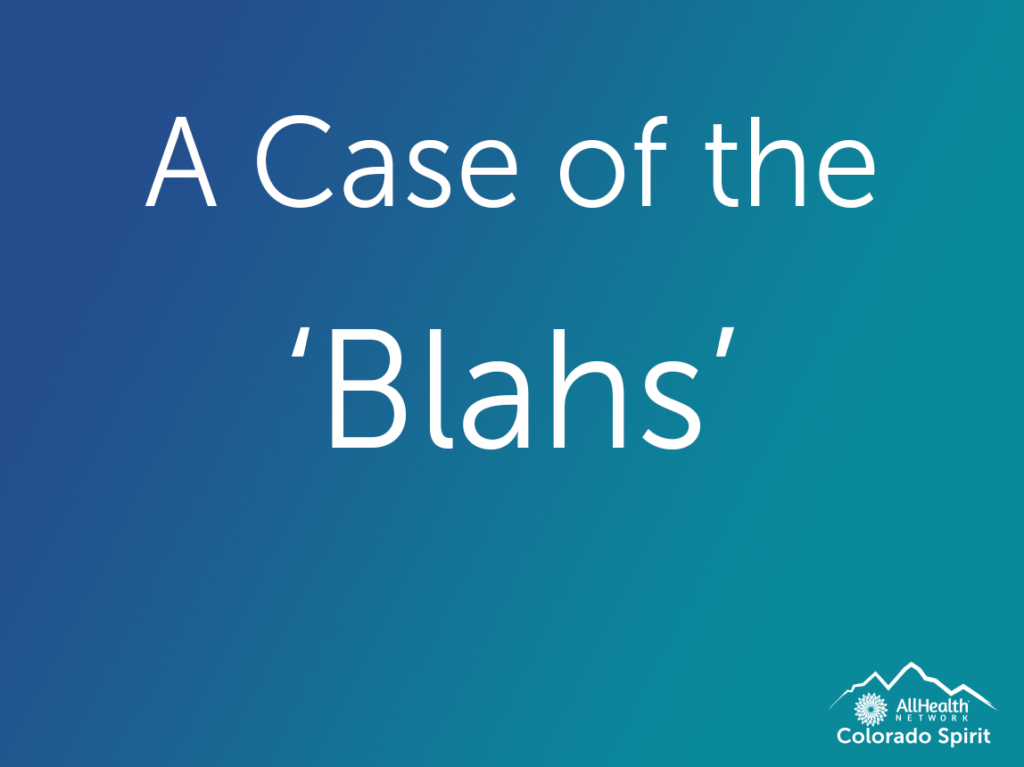Last week the Colorado Spirit team was chatting about ideas for a topic for this Well-Being Connection. I shared with the team that I was feeling kind of “blah” (a very technical description of emotions, I know!) and was having a hard time coming up with ideas. I assumed my “feeling” was unique to me. As we are always saying in the Colorado Spirit team though, “you are not alone,” and I quickly realized many other folks were having similar experiences and were hearing things like that from their friends and family.
Reflections and Takeaways on Why Folks may be Feeling Blah
This is a good time to think about what actions you can intentionally take to sustain yourself. Be sure to read next week’s post as the Colorado Spirit Team at AllHealth Network is going to share our list of self-preservation go-to’s.
- Don’t be like me and say you feel “blah.” Dive in to your experience. What emotion (or emotions more likely) are you noticing? Here is the thing about emotions, they are sending us a message and the more we ignore the message by stuffing the emotion down or not really listening and dismissing it, the louder the message gets. Sometimes it is difficult to identify exactly what you are feeling. We find that talking to others, taking some quiet time to reflect, journaling, or even looking at a list of emotions like the emotion wheels mentioned here can help. I know after a little intentional focus and time with an emotion wheel, my “blah” feeling was better described as a mix of annoyance, apprehension, and some sadness.
- Consider where your focus is and what actions you are taking. A great video by Dr. Lucy Hone reminds us that asking “is this helping me or hurting me” can be useful.
- Examine your self-talk or automatic thoughts. Often times the way we talk to ourselves impacts our emotions. If our self-talk is critical, focused on the negative, or distorted in some way we might end up in a loop of intensifying and overwhelming emotions. Sometimes finding a more balanced way to reframe our thoughts can help us break out of this cycle. The National Center for PSTD suggests several reframes of thoughts related to COVID. We also recently shared a post about self-compassion as a tool and have a future post for you all about self-talk.
- Focus on what you can influence and find ways to let go of or distance yourself from the other things. One team member shared this with me, “2021 was supposed to be like cruising the beach front with the sun shining on your face and the top down. Instead, it feels more like cruising down a cloudy wintery Colorado highway and hitting a patch of ice. Whatever the ‘ice’ might be in your life, remember that it’s easy to focus too much on the ice and be outraged that it had to end up on the highway that we were traveling. But instead of focusing on the ‘ice,’ we should focus on what we can control, your vehicle and your actions within the vehicle. Remember you can be mad that there is ‘ice’, but you can’t control the ‘ice’.”

If speaking to someone would help, please reach out.
AllHealth Network provides several supports:
- To speak with someone in the Colorado Spirit Program about stress related to the pandemic:
- Please call 720-707-6789 (English or Spanish) or visit our webpage at allhealthnetwork.org/Colorado-Spirit
- Or see our Spanish page here: allhealthnetwork.org/colorado-spirit-esp
- For information about other services at AllHealth Network or to get connected with ongoing behavioral health support:
- Please call 303-730-8858. AllHealth Network is continuing to provide service via telehealth or by phone and our Crisis Walk-in Center remains open 24/7.
- If you are experiencing a mental health crisis and are in need of immediate assistance, please call the Colorado Crisis Hotline at 1-844-493-8255 (TALK) or text TALK to 38255.
How do you know if you’re experiencing a mental health crisis? Click here to learn about mental health crisis warning signs to look out for from the National Alliance on Mental Illness (NAMI).
Be sure to follow us on Facebook to receive information about our free groups and get notifications when we post coping tips, mindfulness suggestions, and more.


